外研版七年级英语上册Module7_Unit3_Language_in_use
外研(新标准)版七年级上Module7 Computers Unit3 Language in use课件(共28张PPT)
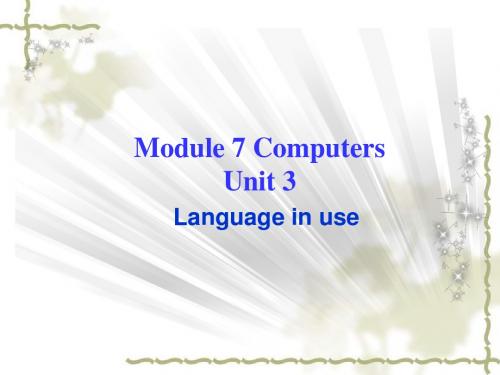
A: The birthday party is coming , let’s buy some gifts. B: Sure. Any good ideas ? A: I’d like to buy a sweater. They feels warm and comfortable. B: That’s a good idea. Let’s go.
sweet. They taste soft. hard.
look fresh. They
taste sweet. sour
look fresh.
They
taste sweet.
It tastes
delicious.
cool.
smellபைடு நூலகம் fresh. It tastes delicious.
A: The birthday party is coming , let’s buy some gifts. B: Sure. Any good ideas ? A: I’d like to buy a sweater. They feels warm and comfortable. B: That’s a good idea. Let’s go.
The party _____________ sounds noisy .
1. The cakes taste ______________. delicious 2. The bananas ____________. smell good 3. The students ____________. look happy 4. The flowers ____________. smell sweet seems friendly 5. The teacher _______________. 6. The juice ______________. tastes sour 7. The chair ___________________. feels comfortable sounds beautiful 8. The music _________________.
2019秋外研版七年级英语上册教案:Module 7 Computers Unit 3 Language in use
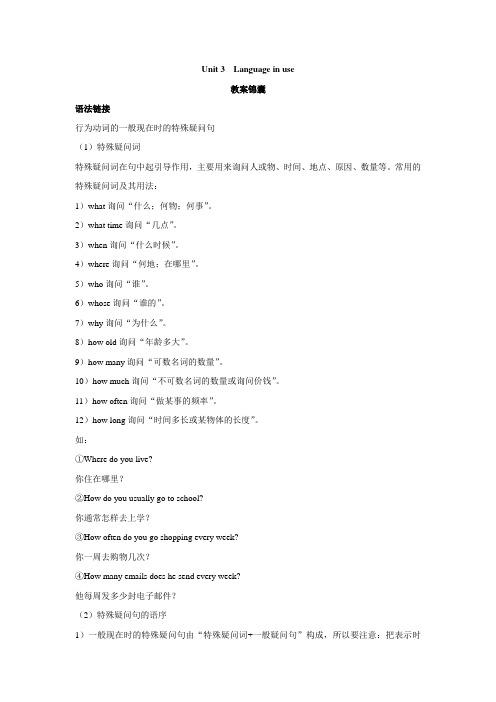
Unit 3 Language in use教案锦囊语法链接行为动词的一般现在时的特殊疑问句(1)特殊疑问词特殊疑问词在句中起引导作用,主要用来询问人或物、时间、地点、原因、数量等。
常用的特殊疑问词及其用法:1)what询问“什么;何物;何事”。
2)what time询问“几点”。
3)when询问“什么时候”。
4)where询问“何地;在哪里”。
5)who询问“谁”。
6)whose询问“谁的”。
7)why询问“为什么”。
8)how old询问“年龄多大”。
9)how many询问“可数名词的数量”。
10)how much询问“不可数名词的数量或询问价钱”。
11)how often询问“做某事的频率”。
12)how long询问“时间多长或某物体的长度”。
如:①Where do you live?你住在哪里?②How do you usually go to school?你通常怎样去上学?③How often do you go shopping every week?你一周去购物几次?④How many emails does he send every week?他每周发多少封电子邮件?(2)特殊疑问句的语序1)一般现在时的特殊疑问句由“特殊疑问词+一般疑问句”构成,所以要注意:把表示时间、地点或方式的特殊疑问词放在句首,疑问词后面句子的结构顺序与一般疑问句的语序一致。
如:①How much milk do you have every day?你每天喝多少牛奶?②What do they like for breakfast?他们早餐喜欢吃什么?2)疑问词本身作句子主语时,后面语序不变。
如:①Who can help me?谁能帮我?②Which is your favourite?哪个是你最喜欢的?③What makes you so happy today?今天什么事让你这么高兴?(3)特殊疑问句的答语特殊疑问句不能用yes或no来回答,而要根据具体情况,用陈述句回答。
_Module 7 Unit 3 Language in use 课件---外研版七年级英语上册

Do you use a computer for your homework?
Work with the whole class. Ask and answer questions in Activity 5,and make notes.
Work in your group. Make a survey about students and computers. Use the notes you made in Activity 6 to help you. Seven students have a computer at home. Five students use a computer for their homework...
Complete the sentences with the correct form of the words from the box.
check like plan talk use 1 Tom _c_h_e_c_k_s__ his email every Saturday. 2 I have a computer,but I don't ___u_s_e___ it. 3 Come to my office.Let's __p_l_a_n___ for our holiday. 4 My mother doesn't ___l_ik_e___ computer games. 5 I can ___ta_l_k___ to my friends on the Internet.
(多少),how much (多少),how often (多 久一次),how long (多长),how soon (多 久),how far (多远)。
Module 7 Unit 3 Language in use.课件外研版英语七年级上27张PPT

Module 7 Unit 3 Language in use.课件外研版英语七年级上(27张PPT)(共27张PPT)Module 7ComputersRachel_jiangqiUnit 3Language in useRachel_jiangqiTeaching FocusObject: To understand questions and answers in the present simple tenseTo talk / write about how on uses the computerWarming upReviewWhat can you do with the computerI can … with the computer.ReviewFill in the blanks with the correct form of the words.customer game Internet learn search share sometimes useI have a computer. It’s a small one. My mum and I it. My mumit to talk to herand I use it to play . It’s interesting! But I don’t spend a lot of time on my computer.shareusescustomersI have a computer. It’s a small one. My mum and I it. My mumit to talk to herand I use it to play . It’s interesting! But I don’t spend a lot of time on my computer.gamesReviewFill in the blanks with the correct form of the words.customer game Internet learn search share sometimes useI like reading. I use theto for new books. I want to more about Chinese history.SometimessearchlearnI like reading. I use theto for new books. I want to more about Chinese history.Language points特殊疑问句特殊疑问句的构成:疑问代词/ 副词+ 一般疑问句(语序)例:How do I write my homework on the computerWhat do I do nextWhere do I write the nameLanguage points特殊疑问句2. 特殊疑问词:whatwhowherewhywhenhow询问原因询问方法询问事物询问地点询问时间Language points 特殊疑问句2. 特殊疑问词:whatwhowherewhywhenhow询问事物询问人询问地点询问原因询问时间询问方法注意:特殊疑问句不能用yes 或no 来回答, 而应根据它所询问的内容直接作答。
外研七年级上Module 7Unit 3

4. My mother doesn’t __l_ik_e___ computer games.
5. I can __t_a_lk___ to my friends on the Internet.
The first computer
My name is ENIAC. I am the first computer in the world. I was born in 1946 in America. I am very big, about one and a half times the size of a classroom. I am very heavy — 30, 000 kilos!
I was born in 2000. 出生 The size of my shoes is 35.
questions
Name 1 Name 2
Do you have a
computer at home?
Do you use a
computer for your
homework?
A. 完成句子: 1. 请打开灯,天太暗了。
序数词 eleventh twelfth thirteenth fourteenth fifteenth sixteenth seventeenth eighteenth nineteenth
缩写 11th 12th 13th 14th 15th 16th 17th 18th 19th
基数词 20. twenty 30. thirty 40. forty 50. fifty 60. sixty 70. seventy 80. eighty 90. ninety
4. 他通常使用电脑做作业。 He __u_s_u_a_ll_y_u__se_s___ the computer to _d_o__h_is__h_o_m_e_w__o_r_k_.
外研版英语七年级上册Unit 3 教案

Module 7 ComputersUnit 3 Language in use 课型Revision and application教材分析本单元是一个练习单元,是通过练习和活动,对学生在本模块一、二单元中所学的电脑方面的基本词汇、一般现在时的特殊疑问句和答句等知识进行复习和巩固,使学生能更为透彻地理解、更为准确运用所学知识。
语言知识目标1.语法:复习巩固一般现在时的用法,尤其是本模块所学的一般现在时特殊疑问形式2.词汇:①生词:holiday②复习本模块所学的有关电脑方面的词汇语言技能目标1.听:能听懂所学的有关电脑方面的词汇;听懂一般现在时的特殊疑问句2.说:能就电脑的使用进行简单的问答;能运用一般现在时特殊疑问形式进行问答3.读:能读懂简单的特殊疑问句及其回答4.写:能结合本模块所学的语言知识,准确运用所学句型结构写出相关的表达学习策略目标1.认知策略:联系、归纳、推测等技能。
如能通过观察、应用,总结归纳出一般现在时特殊疑问句的用法2.调控策略:从同伴处得到反馈,对自己在叙述及书写中的错误进行修改3.合作学习策略:同学之间互相学习,取长补短文化意识目标了解不同国家和地区的人们使用电脑的情况情感态度目标通过学习电脑方面的词汇提高对英语的学习兴趣任务设计一个有关电脑方面的问卷教学重点1.复习巩固一般现在时的用法,尤其是本模块所学的一般现在时特殊疑问形式2.复习巩固本模块所学的电脑词汇及一些动宾搭配的使用。
教学难点较熟练地运用本模块中所学的词汇和句型,区别应用助动词do, does教学方法任务教学法教学设备录音机;多媒体课件教教学步骤设计意图教师活动学生活动Step 1Warming-up对本模块所学的有关电脑的词汇进行复习,在复习过程中调动学生的学习积极性。
强化对词汇及一些动宾搭配的理解、记忆和掌握,为任务的开展做好词汇的储备。
1.Greetings.2.Review the words.1) I can see pictures and information onit.(screen)2) Ican use it to print my homework.(printer)3) I can type information into the computer.(keyboard).4) I can click it and open a new document.(mouse). What are they?3. Show some pictures to review the text ofUnit 1 and Unit 2.1. Greetings2. Guessing.3. Look at thepictures, andanswer theteacher’s questions.学过程Step2Languagepractice复习一般现在时疑问句句式。
外研版英语初一上册Module7Unit3教案
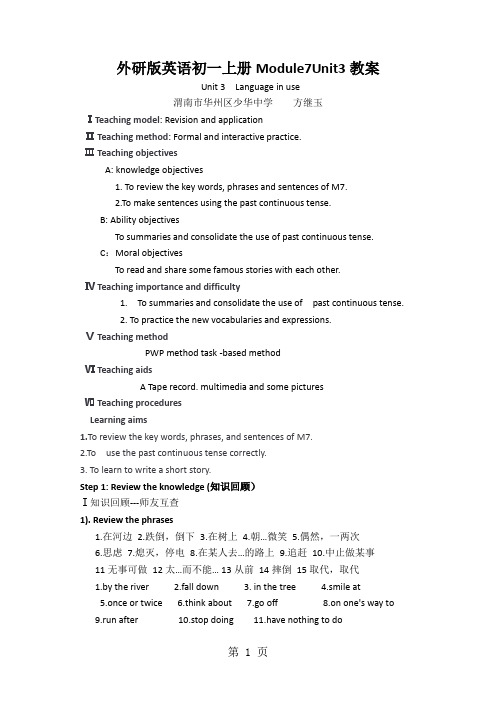
外研版英语初一上册Module7Unit3教案Unit 3 Language in use渭南市华州区少华中学方继玉ⅠTeaching model: Revision and applicationⅡ Teaching method: Formal and interactive practice.Ⅲ Teaching objectivesA: knowledge objectives1. To review the key words, phrases and sentences of M7.2.To make sentences using the past continuous tense.B: Ability objectivesTo summaries and consolidate the use of past continuous tense.C:Moral objectivesTo read and share some famous stories with each other.Ⅳ Teaching importance and difficulty1. To summaries and consolidate the use of past continuous tense.2. To practice the new vocabularies and expressions.Ⅴ Teaching methodPWP method task -based methodⅥ Teaching aidsA Tape record. multimedia and some picturesⅦ Teaching proceduresLearning aims1.To review the key words, phrases, and sentences of M7.2.To use the past continuous tense correctly.3. To learn to write a short story.Step 1: Review the knowledge (知识回顾)Ⅰ知识回顾---师友互查1). Review the phrases1.在河边2.跌倒,倒下3.在树上4.朝…微笑5.偶然,一两次6.思虑7.熄灭,停电8.在某人去…的路上9.追赶10.中止做某事11无事可做12太…而不能… 13从前14摔倒15取代,取代1.by the river2.fall down3. in the tree4.smile at5.once or twice6.think about7.go off8.on one's way to9.run after 10.stop doing 11.have nothing to do12.too...to 13.once upon a time 14.take the place of(师友先自己完成,再相互查抄)2). Review the important drills课文原句在现1.Alice was sitting with her sister by the river.2.It was sitting in a tree and smiling at everyone.3.It was too dark for her to see anything.4.While she was falling, she was thinking about her cat.5.It was very polite of you to sit down.6.They were having a tea party in the garden.7.Where was it going?Ⅰ知识回顾—2.西席点评已往举行时态:主语+was/ were+doing.Do--doing:1.一般环境直接加ing . talk--talking call--calling buy--buying.2 .以哑e末尾去饿加ing. take--taking3 以重读闭音节末尾,末尾只有一个子音字母,双写+ing. run--runningsit--sitting stop--stopping特殊:lie -- lyingStep 2 Explanation 题型讲解II.题型讲解—1.师友互讲1). Underline the correct words.1 Suddenly, all the lights in my house_________ . There was heavy rain outside.2 —I called you up at seven o’clock last night, but nobody answered it. —Really? I’m sorry, but I _____________ a piano lesson at school.3 —I ______you and Tom in the library just now.—Oh, we________________several visitors around the school.2).Write down what each member of your group was doing at eight o’clock last night. Sun Li was watching TV at eight o’clock last night.1___________________________________________2___________________________________________3___________________________________________4___________________________________________1 The dog is ___ the cat in the garden.2__________is this machine____________ ?3 He ______________ and was very bored.4 She is_____________how to finish the story.5 I wrote to him_________________ , but he did not answer.(师友自己练习,学友讲给师傅听,师傅改正错误,并说明原因,师傅帮助学友完善笔记)II.题型讲解—2.西席概括1.已往举行时与一般已往时的区别:一般已往时与已往举行时都是产生在已往。
外研版初中英语七年级上册(WY)教案 Module 7 Unit 3 Language in use
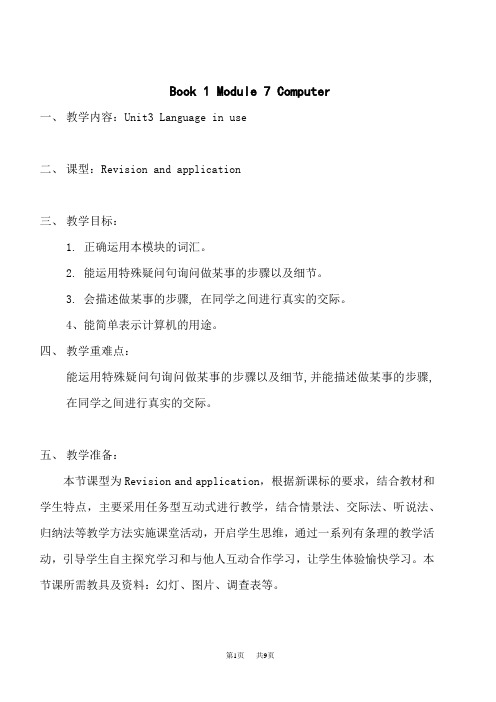
Book 1 Module 7 Computer一、教学内容:Unit3 Language in use二、课型:Revision and application三、教学目标:1. 正确运用本模块的词汇。
2. 能运用特殊疑问句询问做某事的步骤以及细节。
3. 会描述做某事的步骤, 在同学之间进行真实的交际。
4、能简单表示计算机的用途。
四、教学重难点:能运用特殊疑问句询问做某事的步骤以及细节,并能描述做某事的步骤, 在同学之间进行真实的交际。
五、教学准备:本节课型为Revision and application,根据新课标的要求,结合教材和学生特点,主要采用任务型互动式进行教学,结合情景法、交际法、听说法、归纳法等教学方法实施课堂活动,开启学生思维,通过一系列有条理的教学活动,引导学生自主探究学习和与他人互动合作学习,让学生体验愉快学习。
本节课所需教具及资料:幻灯、图片、调查表等。
六、教学过程:theandtheto dialoguesto homework 1.The students act out the dialogues in pairs about how to write homework on a compute r with the pictu res.thedoandthethedoandthe OrganizationOrganizationthe 1.Match the questions with the answers. Then check the answers with the partners.plete the conversations.3. T hey will have a match for writing on the blackboard. (See which group can write the most correct sentences of the four groups.)4. Two students will collect the sentences on the blackboard. Andstudents doActivity 3 andthe n check theanswers.6.Ask thestudents towrite questionswith the wordsin the form.answersWhat/ do onthe computerH ow/ open adocument1.Students interviewtheir best friendsabout using acomputer. They use thequestions in the formabove and write downtheir best friends’information2. Make a report abouttheir best friends’answers, using theinformation in theform. Then share withthe class.3. Ask the students to write about their using a computerwith” first, next, then, finally…”4. Organization.1.Get the students to sum up the language points.T: What have we learned toda y?Ss:……2.Let theWrite an email to your best friend about their using acomputer with” first, next, then, finally…”Module 7 ComputerUnit 3 Language in use 小组评价First, next, then, finally,… T1T2 T3I usually/ sometimes/ d on’t usually…?What…?Where…?How often…?达标训练题一.按要求改写句子。
外研版英语七年级上册M3 My new school Unit 3 Language in use教案附达标练习题及答案

初一上册G7M3U3 教学设计Module3 My new school内容简析:本模块以学校为话题介绍there be 句式的使用,对大部分学生来说,其所在学校是新学校通过种种句式以学校的设置和教室的状况进行介绍,教师也可根据学生的情况扩展话题,便于开展活动.目标定位:本单元的教学重点和难点是学生能熟练地利用there be句型介绍自己的班级和学校.能自如地运用所学英语进行交流,将输入的语言信息在一定的语境下合理输出,能自然地运用英文交谈.语言知识目标:1.掌握there be 句型的陈述句,否定句,一般疑问形式及回答。
2.学会运用表地点的介词:behind , in front of , next to ,3.名词所有格表所有关系的“’”语言技能目标:1:能利用there be句型介绍自己的班级和学校,并能正确运用缩写形式。
能参考图片介绍建筑物的位置关系。
2:能面向全班同学做有关学校介绍的欢迎辞情感态度:培养学生热爱学校,热爱自己的家园。
学习策略:培养学生利用图片联想词汇的习惯。
能借助词汇图掌握单词。
恰当运用多媒体辅助教学,运用网络视频,音频等素材,设置情境,模拟真实意义的活动.教学流程:环节一:Warming up An English SpeechTeachers’ Activity: Ask 3-5 students introduce their classroom .Students’ Activity: 3-5 student give an English speech about the classroom . Other studentslisten and find the mistakes. They can also ask the reporter any questionsabout the classroom .设计意图:,以演讲形式开始新课, 激发学生学习兴趣. 为进一步的交流与训练打下基础环节二:In putTeacher’s Activity:1.Show a map of the school (教师可自制简易地图) Ask : Where is the library / science lab/dininghall/gym….? Where are the offices/ classrooms …?2.Let the students describe the buildings’ place in the map .3.Ask the students to do Activity 2 . Then check the answers .Students’ Activity:1. Answe r the teacher’s questions.2. Describe the map in group of 4 .3.Do activity 2 ,complete the sentences by themselves . Then check the answer in pairs ..设计意图:通过问答练习,让学生用英语语言进行交流,并进一步熟悉和巩固以前学习的有关介绍位置关系的表达,充分训练本单元的语言功能项目.环节三: PracticeTeachers’ Activity: 小小设计师let the students draw a map of a new school in the future and describe it .Students’ Activity: 1:Design the map and write sentences near the buildings .2.Introduce the map to other members in their group.(评出最佳设计奖并推荐展评.)设计意图:以小组为单位,运用所学语言结构作解说,巩固刚刚学习过的语言结构,使学生掌握和流畅地使用目标语言。
Module7Unit3Languageinuse课件英语七年级上册

People use it to make maps. It also helps countries see where they may
find oil(石油) 2 gold(黄金).
( C )1.A.in ( B )2.A.so
B.at B.or
C.of C.but
( A )3.A.use ( A )4.A.send ( B )5.A.three ( A )6.A.to watch ( B )7.A.where
because
What
watch also
world our
family
with play happy
三、完形填空。
主题:替约书亚 词数: 难度: 体裁:记叙文
上学的机器人 170 ★★★★☆
正确率: ____ /10
Joshua is a 7-year-old German boy. He is too ill to go to
C
( A )7.A.well C.quickly
( B )8.A.home C.life
B.fast D.happily B.school D.lesson
A local council(委员会) in Berlin 9 the robot for him. Sometimes,
children cannot go to classes for all kinds of reasons.So such 10 help
her homework?
补充:对于特殊疑问句,需要注意两点: ◆特殊疑问句的语序与一般疑问句是一致的; ◆要根据所提问的内容选择特殊疑问词,特殊疑问词总是放在句首。
课堂检测
一、 单项填空。
外研版七年级上册英语M5 My school day Unit 3 Language in use

考点2 表示主语的特征、性格或能力等。 eg:Welovesports.我们喜欢运动。
典例 他们说英语。 _T_h_e_y_s_p_e_a_k_E_n_g_l_i_sh_._______________________
classes______C__.(福州)
A.interested
B.interest
C.interesting
【点拨】此题用分析比较法。句意:——我们都喜欢王老 师。——我同意你的观点。她总是使她的英语课有趣。 interested修饰人,interesting则修饰物。故选C。
知识点 3 finish/'fInIʃ/v.完成;结束;用尽
Languagepractice WehaveChineseateighto'clock. Wedon'thavemaths. Doyoulikemaths? Yes,Ido. Intheevening,IwatchTVandhavedinnerwithmyfamily.
语法讲解
行为动词的一般现在时 (1)
ModuleM5 yschoolday
Unit3 Languageinuse
同学们,上一课学习的单词你们都掌握了吗?现在大家 来检验一下,点击下面的音频开始听写吧!
根据汉语,完成句子。 1.我们在八点钟上语文课。 ___W__e_h_a_v_e___Chineseateighto’colck. 2.我们不上数学课。
(3)____________
,
havebreakfast havelunch startwo and (4)__________ateight.
外研版七年级英语上册教案:Module7Unit3Languageinuse

教学内容与课本紧密关联,旨在帮助学生巩固所学知识,提高英语实际运用能力。
二、核心素养目标
1.提升学生英语语言能力:通过学习本节课内容,使学生能够熟练运用一般现在时和现在进行时描述日常活动和正在进行的动作,提高学生的英语表达和沟通能力。
2.培养学生的跨文化交际意识:让学生在掌握目标语言的基础上,了解并尊重不同文化背景下的日常活动差异,提升学生的国际视野。
外研版七年级英语上册教案:Module7 Unit 3 Language in use
一、教学内容
外研版七年级英语上册教案:Module 7 Unit 3 Language in use
本节课主要围绕Module 7 Unit 3 Language in use展开,内容包括:
1.复习和巩固一般现在时和现在进行时的用法。
(二)新课讲授(用时10分钟)
1.理论介绍:首先,我们要了解一般现在时和现在进行时的基本概念。一般现在时用于描述习惯性动作或经常发生的事情,而现在进行时则用于描述说话时正在进行的动作。了解这两个时态对于准确表达非常重要。
2.案例分析:接下来,我们通过一个具体的案例来展示这两个时态在实际中的应用。案例中的人物正在做不同的事情,我们将学习如何正确使用时态来描述这些动作。
3.重点难点解析:在讲授过程中,我会特别强调一般现在时和现在进行时的区别,以及如何正确变换句型和动词形式。对于难点部分,我会通过对比和实际例子来帮助大家理解。
(三)实践活动(用时10分钟)
1.分组讨论:学生们将分成若干小组,每组讨论一个与描述正在进行的动作相关的实际问题。
2.实验操作:为了加深理解,我们将进行一个简单的角色扮演活动。学生们将模拟不同的场景,用英语描述正在进行的动作。
外研版七年级上册英语M1 Unit 3 Language in use
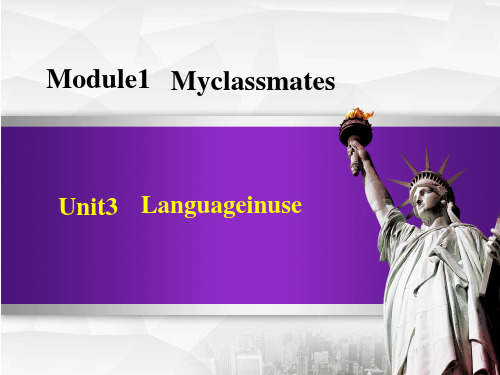
given name/ first name
family name given name
family name /last name
典例 MyfamilynameisGreenandmygivennameisJack. ________ismAyfullname. A. JackGreenB. GreenJack C. JackgreenD. Greenjack
__________?
Howold
Lingling:
I'mfromChina.(4)________________areyou?
Jack:I'mthirteen. Howoldareyou?
Lingling:I'm (5)t_h_i_r_te_e_n__too. I&#_Grade7.Whataboutyou?
am
I________fromChinaanadmI________anactor(演员).
2.This___i_s____mybrother. Hisname___i_s____Bob.
We_______a_raellfromEngland.
HeandTaorme________inthesameschool.
discussion
6
Workinpairs. Introduceyourself. Askandanswer. Hello,myname's... I'm...yearsold. I'mfrom... What'syourname? Howoldareyou? Whereareyoufrom?
知识点 1 InEnglish, thegivennameisfirstandthefamilynameis
七上 Module 7 Unit 3外研社

Work in groups of three.
Write questions about
students and computers.
Questions
Do you have a computer at home? Do you use a computer for your homework?
Module 7 Computers
Unit 3 Language in use
Warming up
How much do you know
多少
about the first computer?
The first computer
My name is ENIAC. I am the first computer in the world. I was born in
our computer, but we ___________ don’t play (not play) games.
3. Daming ___________ doesn’t use (not use) a computer to do his homework, but she ______ plays (play) music. 4. She ________ makes (make) travel plans doesn’t buy on the Internet, but she ___________ (not buy) tickets. don’t have (not have) a 5. We ___________ computer at home, but we ______ use (use) the computer at school.
- 1、下载文档前请自行甄别文档内容的完整性,平台不提供额外的编辑、内容补充、找答案等附加服务。
- 2、"仅部分预览"的文档,不可在线预览部分如存在完整性等问题,可反馈申请退款(可完整预览的文档不适用该条件!)。
- 3、如文档侵犯您的权益,请联系客服反馈,我们会尽快为您处理(人工客服工作时间:9:00-18:30)。
(8). do shopping online ……
定义: 表示经常性、习惯性的动作或现在的 状态。 V. 原形 构成: 肯定句:主+V. V. 第三人称单数
don’t 否定句:主 + +V.原
doesn’t Yes, 主+do/does.
Do 一般疑问句
+主+V原? No, 主 Does +don’t/doesn’t.
save
homework
document
Exercises
A. 完成句子: 1. 请打开灯,天太暗了。 switch on /turn on the light. Please _________________ It’s too dark. 2. 怎样保存文件的? How do I ___________________? save the document ________
特殊疑问句:特殊疑问词 +一般疑问句?
注意: 当主语为I/We/You/They/名词复数时, 用V原形; 当主语为He/She/It/不可数名词/名词单数 时,用V第三人称单数。 3. 与之连用的时间状语: always, usually, often, sometimes, seldom, never, every day/week, on Sundays/…, at the weekend
外研七年级上册
Module 7 Computers
Unit 3 Language in use
Warming up
Discussion
How do you use the computers in daily life?
(1). use computer for school work
(2). play games on the computer (3). send emails to friends (4). surf on the Internet (5). download music and films (6). chat online (7). search for information
3. 她朋友通常在电脑上做什么? What does her friend usually do _____________________________?
on the computer?
4. 他通常使用电脑做作业。
usually uses He ______________ the computer
1.do homework/on your computer? Do you do homework on your computer? 2.What games/play? What games do you play? 3.send emails? Do you send emails? 4.who/ write to? Who do you write to? e/a computer at school? Do you use a computer at school? 6.download music? Do you download music?. 7.What kind of music/ download? What kind of music do you download?
来源于:苏科全科网 []
三. 用所给动词的适当形式填空。 1. -What does ____Tom usually do __ (do) at the weekend? -He often sends _____(send) emails to his friends in the USA. 2. Does ____ his brother often ____ play (play) computer games? 3. His father ____________(not watch) doesn’t watch TV every evening and he often ______(write) novels on his computer. writes
Quiz
一、单项选择。 1. — ____ do you have an English lesson? — Every day. A. How often B. How long C. How many D. How much 2. — _______ are you going now? — The bus stop. A. Why B. How C. Where D. what
注意:特殊疑问句不能用yes或no来回答, 而应根据它所询问的内容直接作答。 e.g.:
一般现在时的特殊疑问句 (Wh-questions in present simple)
Examples in this module: How do I write my homework on the computer? How do I save the document? What’s the mouse? What do I do next? Where do I write the name? Where do you write your homework?
3. -____ do you have a computer class? - Twice a week. A. How long B. How often 4. ___Lily and Lucy want to download music? A. Do B. Does 5. ___ the radio. I’d like to listen to the weather report.(天气预报) A. Open B. Switch on
Work in pairs. Ask and answer.
Eg.
have a computer at home? Do you have a computer at home? When/ use/ a computer? When do you use a computer?
Work in pairs. Ask and answer.
来源于:苏科全科网 []
二. 用所给单词的适当形式填空。 1. _____ First (one), you must tell me what your name is. 2. You need to wait because Daming is using the printer ______ (print) now. 3. Three days later, he ______ finally (final) arrived at the village. switches (switch) on the 4. He usually _______ computer as soon as he gets home.
来源于:苏科全科网 []
makes (make) travel plans on the 4. She ______ Internet, but she __________ doesn’t buy (not buy) tickets. 5. We don’t _________ have (not have) a computer at home, but we often ___ use (use) the computer at schoo boxes _____ (box) have you got? 6. Linda’s sisters often __ do (do) their homework on the computer, but does (do) so. Linda never ____ 7. Sometimes they ____(buy) tickets on buy the Internet. give 8. Please ____(give) me a bottle of juice.
一、特殊疑问句的构成:是由“疑问代 词或疑问副词 + 一般疑问句”构成的。 二、特殊疑问词: what (询问事物) how much (询问价格) what time (询问时间, 尤其是钟点) what kind of (询问种类)
why
(询问原因)
who where
(询问人) (询问地点)
B. 根据首字母提示完成短文: Lingling wants to write her homework ut on the computer. (1) B____ she doesn’t know (2) h____ to do it.ow Daming is helping her. (3) F____, use theirst mouse and click “new document” to (4) o____ it. pen
Complete the sentences. (Activity 3)
1. Tony doesn’t __________ visit (not visit) his uncle, but he often sends _____ (send) emails. 2. We ___ use (use) the Internet, but we _________ don’t play (not play) games on our computer. 3. Daming doesn’t _________ use (not use) a computer to do his homework, but he __________( download) music. downloads
eyboard to write her Next, use the (5) k________ ocument homework in the new (6) d________. ave the Then, click “ save” to (7) s____
